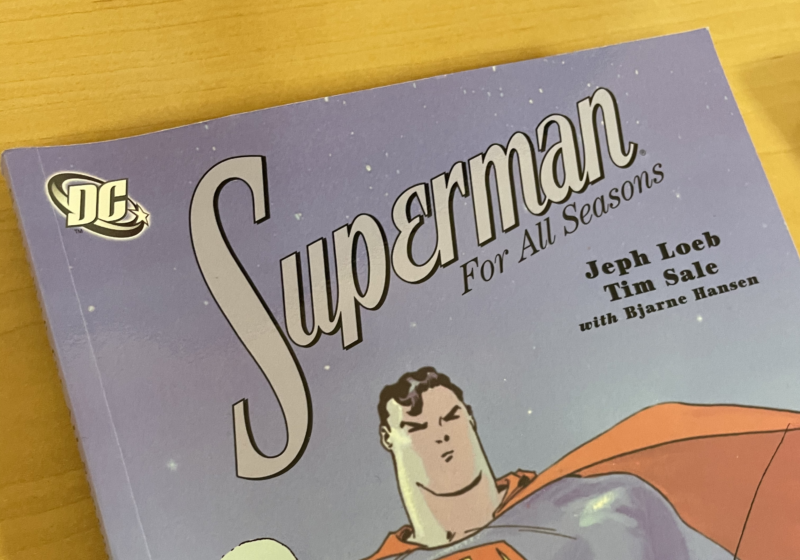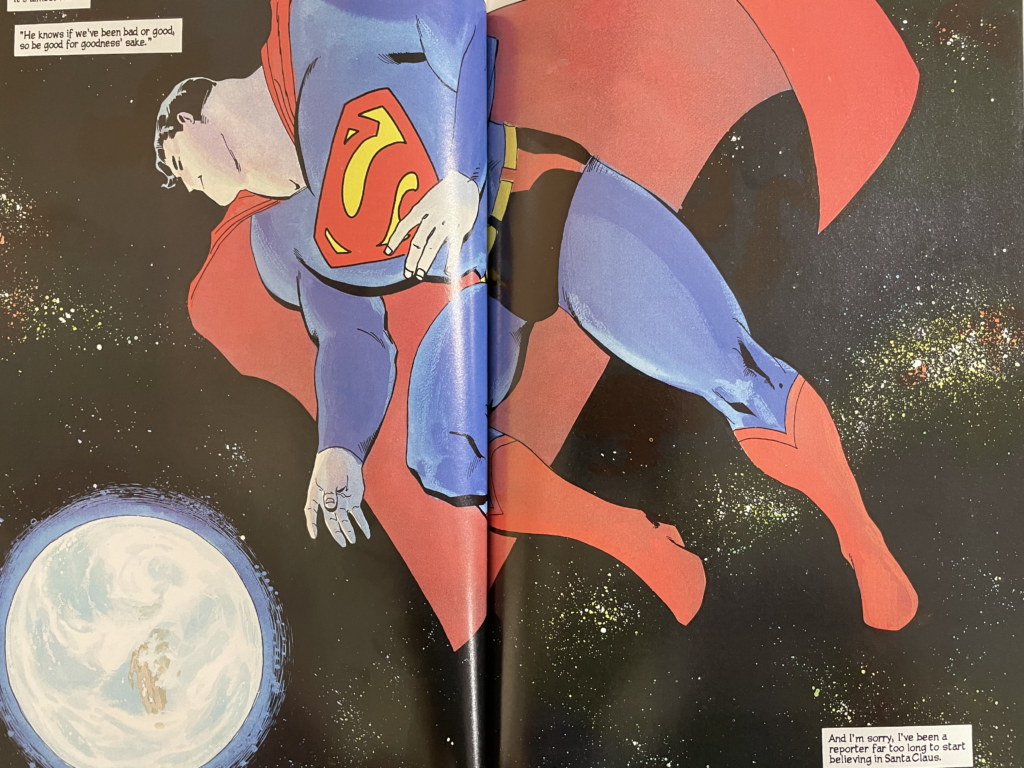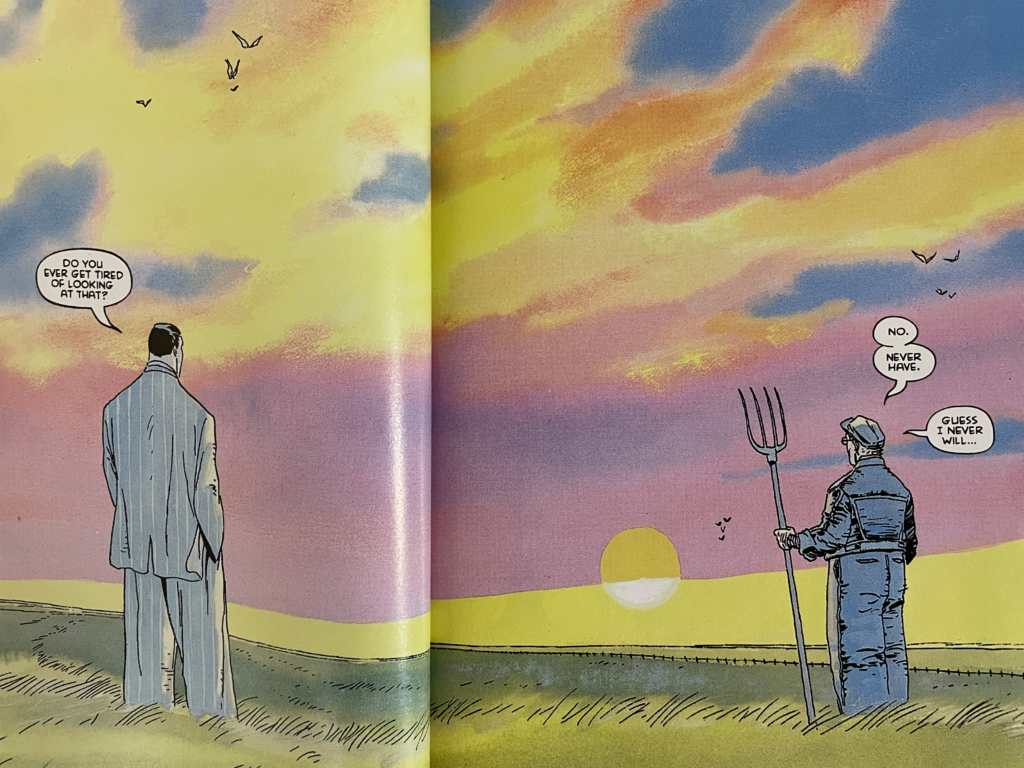When I was in my early teens, I got into superhero comics. I never kept up with any of the modern serials — far too much self-indulgent power fantasy and soap opera bullshit for me. Instead, I read classic limited edition series. I’ll never forget reading “The Dark Knight Returns” and “Watchmen,” where tight, self-contained stories took center stage. They were smartly written, politically subversive, and led me to question the mythological underpinnings behind each hero. “The Dark Knight Returns” featured an aged, violent, and slightly mad Batman who pushed the ethical boundaries of what a superhero could do and still keep his title. “Watchmen” detailed the multitude of dark implications of how superheroes would act if they existed in a more realistic world.
I didn’t know it then, but these stories would subconsciously fuel my more cynical perception of superheroes as far too idealistic for a world as dark as the one we live in today. Superman was the main target of this cynicism: to me, he was emblematic of naive optimism and reductionist American nationalism. His catchphrase is “truth, justice, and the American way,” for God’s sake. New superhero TV series like “The Boys,” which features its own dark twist on Superman named Homelander, also contributed to my cynical view. Homelander is an arrogant, bigoted, and violent monster, corrupted by his own god-like powers and the blind worship his world gives him. He is also emblematic of U.S. foreign policy and aggressive nationalism which contributes to America’s signature brand of white supremacy, violent imperialism, and capitalistic greed.
My disdain for hero worship and disillusionment with the United States spurred me to revisit Superman as a character; I wanted to verify if my cynical view of him was truly representative of what he stands for as a superhero. I chose author Jeph Loeb and illustrator Tim Sale’s “Superman For All Seasons” as the beginning of my reevaluation of the hero, because as I vaguely recalled, the limited series focused more on Superman’s condition as a man than any vehicle for idiotic idolization or dogmatic American exceptionalism.
I’m happy to say that upon re-reading “Superman For All Seasons,” much of my disdain for Superman has subsided. The four-issue limited series is a fantastic read in its own right, especially if you have an interest in Superman and his mythology. It foregoes any hero-worship or pro-United States propaganda, and instead simply tells the story of a good person who discovers they have god-like abilities and the burdens that come with such power.
“Superman For All Seasons” is a thoughtful, subtle, and frankly beautiful coming of age story for Superman. Much of the story follows Superman as Clark Kent, who is charmingly characterized as a real person, quiet and gentle.When he is teased for his aloof nature by friends and family, he shrugs it off as nothing, admirably passive but confident in his personality. This is sharply contrasted with his illustration, as he’s drawn towering in size over his loved ones and occasional enemies. More than any other representation of Superman that I can think of, “Superman For All Seasons” reminded me of how Superman is a gentle and lovable giant.
Superman’s vulnerability and likeability make the adversity he faces throughout the comic even more impactful. Without spoiling too much, the limited series raises the question: What happens when the man who can do anything fails when it matters the most? Throughout the story, Superman grapples with the high expectations he sets for himself and the inevitable failures he has to face — because even with his god-like powers, he is still only a man in a world permeated by tragedy. When he inevitably becomes tortured by a loss he feels he should have prevented, the comic follows him overcoming it and eventually striving to do as much good as he can even in the face of failure.
Tim Sale’s illustrations throughout the comic are also gorgeous. Throughout the series’ four issues, named after the four seasons respectively, are multiple breathtaking spreads that brilliantly complement the thematic implications of the story.
I love “Superman For All Seasons,” and after reading it again, part of me loves Superman again as I did when I was younger. Even though the undeniable darkness of our world can make a character as wholesome as Superman seem reductionist and even naive in nature, these qualities can still inspire idealism in me. Even through my cynicism, the hope and inspiration I felt from reading “Superman For All Seasons” shone, just as it did when I was younger, when my view of the world was as green and pure as some of the comic’s pages.








